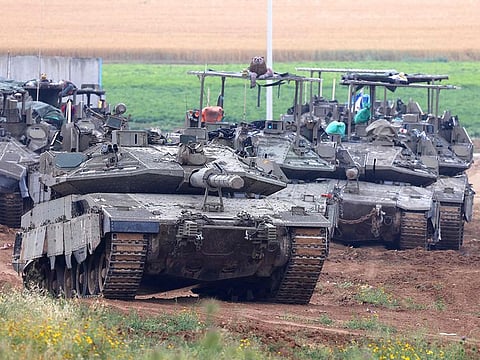Who will win the battle between Israeli tank and Palestinian memory?
Israel’s war on Palestinian refugee camps is an assault on memory itself

Referring to the 750,000 Palestinian refugees who had been, in a cold-blooded act of ethnic cleansing, expelled from their homeland in 1948, David Ben Gurion, Israel’s first prime minister, said in May that year, soon after the Zionist state was established in Palestine: “We must do everything in our power to ensure that they never return”.
More than three quarters of a century after the fact, the animus that leaders of this state continue to harbour toward these refugees and their descendants, toward the enclaves they inhabit and toward the United Nations Relief and Works Agency (UNRWA) that sustains these enclaves’ existence has been pathological in its extremes.
And at no time has the pathology that propels that animus become more plainly visible than during the war in Gaza, where the Israeli military’s deadly strikes made their first targets the 8 refugee camps there, which were left an inhabitable landscape of rubble.
And soon after the ceasefire in Gaza took hold on Jan. 19, Israel’s military forces shifted their focus on the 23 camps in the West, and in particular to those densely populated ones in the north of the occupied territory, where tanks were used to turn them also into a landscape of rubble. Tens of thousands were made to flee their homes. News reports have put the figure at 40,000.
This was followed last week by the Zionist state’s Defense Minister, Israel Katz, declaring, in the manner of a medieval general issuing a diktat to a conquered people, “Thy will not be allowed to return”.
Outset of occupation
Look, everybody and his uncle living on God’s green Earth knows by now of Israel’s expansionist designs on the occupied Palestinian territories. And we know of the forces that drive these designs. They were made explicit and crystal clear by Zionist ideologues at the outset of the occupation.
Just as the concept of lebensraum — the appropriation and settlement of occupied land for “living space” — once served as a critical building block of the Nazi worldview, driving Germany’s military conquests and racialist policies, so has in our time the concept of “Eretz Israel” become for Zionists not just a messianic yearning for a return to a mythical Zion but also a vital strategic component of Zionism’s vision. That we know. And that became clear on day one after Israel in 1967 captured and then went on to build colonies in the West Bank and Gaza.
But how do you explain Israel’s particular obsession with Palestinian refugee camps and its crazed campaign to subject their inhabitants to an experience of displacement on a scale not seen since 1948?
To be sure, when Israeli leaders tell you they dread Palestinian refugee camps, their dread is not misguided. Palestinian refugee camps, you see, are not refugee camps but places of the mind where people live in a kind of arrested past, off a labyrinth of alleys and lanes named after the cities and towns and villages that they or their ancestors had been expelled from in Palestine, or named after mountains, valleys and rivers they lived close to there. The old generation transmitted their memories of the old sod — their lost, beloved acre — to the new generation, who acted as these memories’ custodians.
Also Read: How the world failed Palestine
"Sons of the camps"
I can tell you, as a Palestinian who once was an awalad mukhayamat — literally, a “son of the camps”, but more accurately in camp argot a “boy from the hood” — that your sense of self as a Palestinian is more honed at the whetstone of hardship you endure in a refugee camp than anywhere else in the world.
No other place can replicate its rebellious spirit, its élan, its abandon or what the 14th century hstoriagrapher and sociologist Ibn Khaldun called assabiah. Refugee camps are the vanguard. It is they that impact their surroundings — not the other way around.
In a refugee camp your semantic fashion of expression, your idiom and metaphor, your memories, the essential repertoire of your subjectivity as an individual, your habits of feeling, your inner history as a refugee are well defined.
And you share these with outsiders, when you share them at all, carefully, much like currency borrowed at high interest. It is a place, above all, where the inherited trauma of the nakba can always be tempered by people’s collective dream of the awda, “the day of return”, when the soul of one’s nation will one day be returned to grace.
Israeli leaders’ dread of us, I say, is not misguided. They know that we know, and we know that they know, what their own chief of general staff, Moshe Dayan, said in 1954 — “There is not one single place in this country [Israel] that did not once have a former [Palestinian] Arab population”.
In one of his rare moments of moral rectitude, this Zionist leader touched on a resonant and stubborn historical truth that three generations of Palestinians have grown up with like they have grown up with their skin.
So, Israeli tanks can — and easily — destroy refugee camps but not transmitted memories. And here’s a mot juste from an awlad mukhayamat kiddo to Israel’s defence minister who wants to “ensure” that Palestinians expelled from their camps “will never return”: Memory is anchored in time not in place.
And who will win the battle between tank and memory? Forget about it.
Fawaz Turki is a noted academic, journalist and author based in Washington DC. He is the author of The Disinherited: Journal of a Palestinian Exile.



